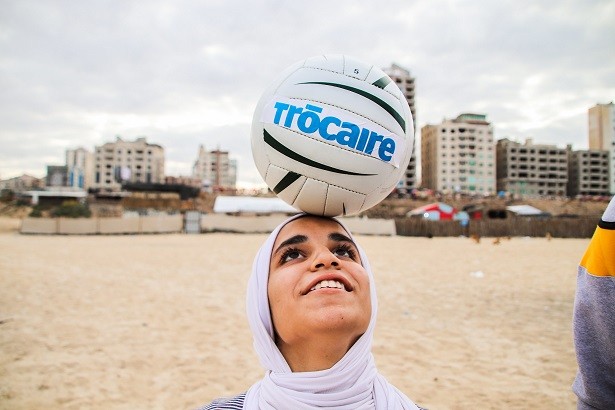Donations remained strong in 2019, but the effects of Covid-19 cast a shadow over the future, writes Ruadhán Jones
On the surface of it, the annual report for 2019/20 from Trócaire is a positive one, in so far as these ever are. However, the arrival of Covid-19 hangs as a cloud over both fundraising and development goals for the aid agency of the Church in Ireland. The annual report – published on Tuesday – lists the pandemic as number one in its future risks and uncertainties.
The issues facing the nations Trócaire most frequently works with are manifold, but the contributions by the Irish public, institutional funders and grants, enabled Trócaire to serve 2.5 million people in 27 countries.
According to the report, the agency raised €64 million in the financial year 2019/20, which concluded just before the Covid-19 crisis, and spent €67 million. Of this, a “vital contribution” of €23 million was donated by the Irish public. This included €8.3 million in the 2019 Lenten collection, up 10% from 2018, and the 2019 Christmas campaign raised €2.3 million.
“As always, we are tremendously grateful for the great support we receive from the parishioners, the clergy and bishops of Ireland, north and south. They are the lifeblood of Trócaire,” according to the agency’s Chief Executive Officer Caoimhe de Barra.
“Such support, as well as our ongoing partnership with Irish Aid, allows us to work with local partners in an effort to tackle poverty and injustice in some of the world’s poorest regions,” she said.
Resources
Of the 2.5 million people the organisation supported last year, 1.8 million people received humanitarian support, while an additional 700,000 people were supported through Trócaire’s long-term development work.
The report is broken up into a number of ‘Strategic Goals’, including human rights, equality in resources, women’s empowerment and protection of human dignity. This work includes women’s empowerment projects, in particular educational support but also helplines and health centres to treat victims of gender based violence.
It also includes support for human rights defenders (HRD), including the training of new HRDs and the provision of legal supports – as in the case of the release last year of indigenous Human Rights Defender Abelino Chub Caal, who spent two years wrongfully imprisoned in Guatemala.
The report also details how last year saw the charity respond to natural disasters and climatic shocks. Working through their partners, Trócaire provided shelter, food and other vital equipment to 39,000 people across Mozambique, Malawi and Zimbabwe after the devastating impact of Cyclone Idai.
However, where the report only begins to trace the outlines is the effects of the pre-eminent natural disaster, Covid-19, both on the charity and on those to whom it ministers. This is largely because the pandemic only set in during the last two months of the report period, but also because the worst effects of the pandemic may be yet to come.
The implications of this pandemic have plunged already desperately poor people into further poverty”
Ms de Barra highlighted that “the Covid crisis has profoundly changed Trócaire’s work. Over recent months, our programmes have rapidly shifted to helping to stop the spread of the virus in countries that lack the most basic medical infrastructure to deal with an outbreak.”
She continued, saying: “The social and economic implications of this pandemic have plunged already desperately poor people into further poverty. While our immediate response will continue for many months ahead, we are also expecting an increase in hunger in the months ahead.
“We are also concerned about the human rights impact of Covid-19. This crisis may provide authoritarian governments with an opportunity to clamp down on human rights, target human rights defenders and push ahead with projects that violate the rights of communities. Women and girls are also at increased risk of violence due to lockdown measures. Addressing both the drivers and impact of that violence is a priority for Trócaire.”
In other words, according to the report, coronavirus presents a threat once again, most dangerous among those already weakened or debilitated. It threatens a deterioration of human rights through increased militarisation; of access to food and water; and of support services to those already vulnerable, to name but a few.
Vulnerable
If those most vulnerable are to be helped, charities like Trocaire will continue to play a central role. However, they are themselves likely to become victim to the effects of the pandemic. In 2019, the report says, “Trócaire leadership identified a growth in the projected deficit compared to the annual budget”. In response, a number of cost-cutting measures were undertaken, including voluntary redundancies and reduced budgets.
However, the arrival of the virus during the Lenten campaign resulted in very serious impacts on fundraising. Meanwhile, economic recessions around Europe threatened institutional funding resources, which had already seen a decrease of €5 million from the previous year.
While Trócaire has been able to respond to the immediate requirements Covid-19 has presented, it is clear that the effects will linger, both for the agency and for those it serves.


 Ruadhán Jones
Ruadhán Jones Hala Sanak (14), who
plays for Gaza’s first ever schoolgirls’ football club, received a Gaelic football skills session on the Gaza beach with All-Ireland winner and Trócaire ambassador Oisín McConville. Photo: Garry Walsh
Hala Sanak (14), who
plays for Gaza’s first ever schoolgirls’ football club, received a Gaelic football skills session on the Gaza beach with All-Ireland winner and Trócaire ambassador Oisín McConville. Photo: Garry Walsh 